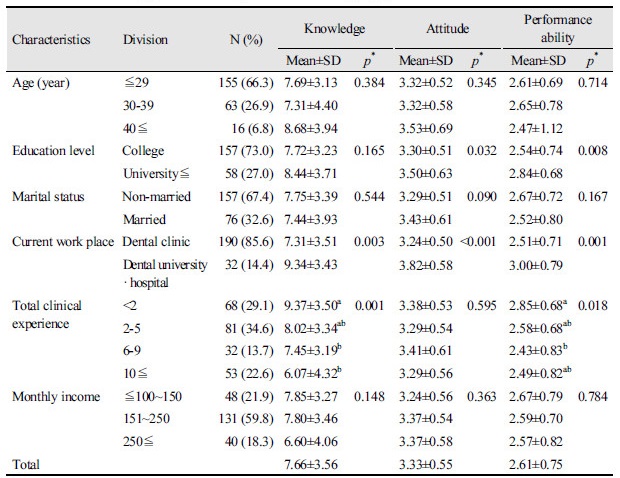Abstract
Objectives: The purpose of this study was to examine the knowledge of dental hygienists on CPR, their CPR attitude and performance ability in an effort to offer data that can contribute to the development of a more effective CPR education program. Methods: A self-reported questionnaire was filled out by 234 dental hygienists in Jeollanam and Jeollabukdo from February 24 to May 20, 2017. The questionnaire asked dental hygienists of the knowledge, attitude, performance ability in regards to CPR. The data were analyzed using SPSS Window ver. 19.0 program through independent t-test, one-way ANOVA, chi-square test and multiple regression analysis. The Cronbach alpha of their CPR knowledge was 0.78, and that of attitude to CPR was 0.79. The Cronbach alpha of CPR performance ability was 0.96. Results: The dental hygienists surveyed in this study who were aware of CPR accounted for 88.9% of total subjects. Dental hygienists who were certified in CPR accounted for 20.5% of total subjects. They received a score of 7.66 on CPR knowledge, 3.33 on attitude and 2.61 on performance ability. There was a positive correlation between the knowledge and attitude, between the knowledge and performance ability and between the attitude and performance ability (r=0.332, r=0.461, r=0.426). A regression analysis showed that the dental hygienists who were younger, who graduated from a four-year university or a higher educational institution, who were CPR certificate holders, who received more CPR education, who were cognizant of automated external defibrillator, who were more knowledgeable on CPR and who took a more positive attitude were more likely to be affected in terms of CPR performance. Conclusions: The dental hygienists surveyed were aware of CPR on the whole, but their CPR knowledge, attitude and performance were not sufficient to perform CPR in emergency situations. More intensive education should be provided for dental hygienists to have an accurate knowledge of CPR to carry it out with a positive attitude.
Acknowledgements
본 연구는 2017년 호원대학교 연구비 지원에 의해서 수행되었음.
Figures & Tables

Table 1. CPR knowledge, attitude and performance ability by general characteristics


